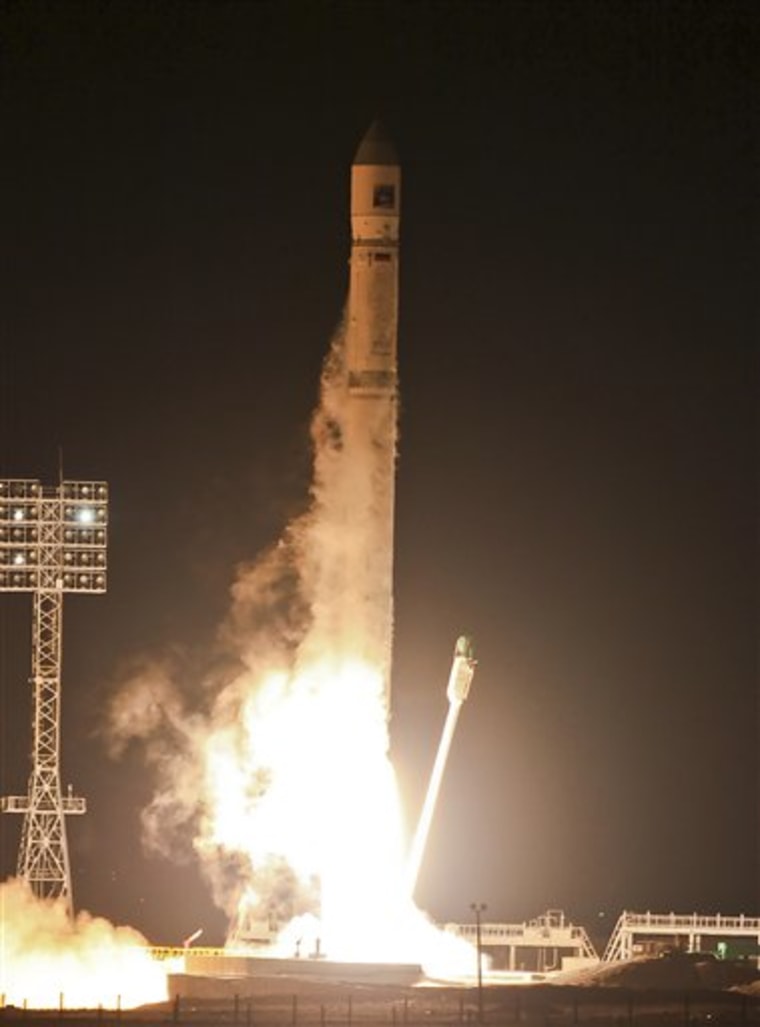Some recent Russian satellite failures may have been the result of sabotage by foreign forces, Russia's space chief said Tuesday, in comments apparently aimed at the United States.
Roscosmos chief Vladimir Popovkin stopped short of accusing any specific country of disabling Russian satellites, but in an interview in the daily Izvestia he noted that some Russian craft had suffered "unexplained" malfunctions while flying over another side of the globe beyond the reach of his nation's tracking facilities.
Popovkin spoke when asked about the failure of the $170 million unmanned Phobos-Grunt probe, which was to explore one of Mars' two moons, Phobos, but became stranded while orbiting Earth after its Nov. 9 launch. Engineers in Russia and the European Space Agency have failed to propel the spacecraft toward Mars, and it is expected to fall back to Earth around Jan. 15.
Roscosmos spokesman Alexei Kuznetsov refused to elaborate on Popovkin's comments, which marked the first time a senior Russian government official has claimed that foreign sabotage has been used to disable one of the country's satellites.
Foreign influences?
Popovkin said modern technology makes spacecraft vulnerable to foreign influences.
"I wouldn't like to accuse anyone, but today there exists powerful means to influence spacecraft, and their use can't be excluded," he said.
James Oberg, a NASA veteran and NBC News space analyst who has written books on the Russian space program, said Popovkin's comments were a sad example of the Russian cultural instinct to "blame foreigners."
"It's a feature of space launch trajectories that orbital adjustments must be made halfway around the first orbit to circularize and stabilize subsequent orbits," Oberg said in emailed comments. "The Russians must know that simple geography — not evildoers lurking in shadows — dictate where their communications 'blind spots' are. But the urge to shift blame seems strong."
Oberg said U.S.-Russian frictions in space policy would be particularly worrisome now, in the wake of NASA's retirement of the shuttle fleet.
"Since for the time being we are dependent for human orbital access on Russian space transportation, we are dependent on their proper safety investigations, so we need to encourage correct attitudes towards those problems," he said in a follow-up email. "Even hinting at the hand of 'enemies' is discouraging, and puts our own people in danger from wrong-headed responses."
The failed Phobos mission was the latest in a series of recent Russian launch failures that have raised concerns about the condition of the country's space industries and raised pressure on Popovkin. Space officials have blamed the failures on obsolete equipment and an aging work force.
Popovkin also said in 2013, Russia will launch three new communications satellites that will be able to retransmit signals from other Russian spacecraft as they fly over another hemisphere.
No cause yet determined
A retired Russian general alleged last November that the Phobos-Grunt might have been incapacitated by a powerful U.S. radar. Nikolai Rodionov, who previously was in charge of Russia's early warning system, was quoted as saying that a powerful electromagnetic impulse generated by U.S. radar in Alaska might have affected the probe's control system.
Popovkin said experts have so far failed to determine why the Phobos-Grunt probe's engines failed to fire, but he admitted that the program had suffered from funding shortages that led to some "risky technological solutions."
The spacecraft was supposed to collect soil samples on Phobos and fly them back to Earth in one of the most challenging unmanned interplanetary missions ever. ("Grunt" is the Russian word for ground or soil.) It was Russia's first foray beyond the Earth orbit since a botched 1996 robotic mission to Mars, which failed when the probe crashed shortly after the launch due to an engine failure.
Scientists had hoped that studies of Phobos' surface could help solve the mystery of its origin and shed more light on the genesis of the solar system. Some believe the crater-dented moon is an asteroid captured by Mars' gravity, while others think it's a piece of debris from when Mars collided with another celestial object.
This report was supplemented by msnbc.com.
